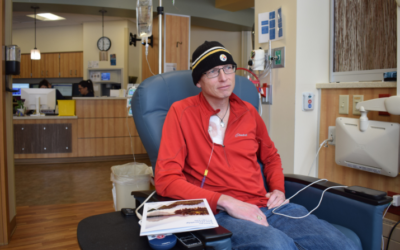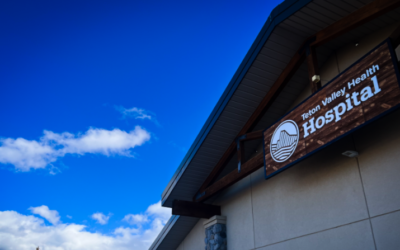Listen to the full episode above. Tune in to ‘State of Jackson’ Wednesdays at 12:30 p.m. and Saturday mornings at 8 a.m.
Rural hospitals have been grappling with looming funding cuts following the passage of the “One Big Beautiful Bill.”
CEO of St. John’s Health, Jeff Sollis, sat down with KHOL’s public affairs co-host Pete Muldoon to discuss how those cuts could crowd emergency rooms and bring higher bills for all.
Pete Muldoon: St. John’s, I think, is a rural hospital. How is that defined?
Jeff Sollis: Really, it’s a matter of population. So the amount, the number of people that are living in a given area, and their proximity to larger Metroplexes. So, you know, we definitely are an isolated community. The nearest larger metroplex, and I wouldn’t even call it a metroplex, but a larger city, would be Idaho Falls, which is a two hour drive away from us. So we definitely would be deemed rural, given our population size and the distance from a bigger city. So yeah, that’s a very high-level definition, but that kind of fits the mold.
PM: You know, how reliant is saying, I think possibly a lot of people think of rural hospitals and they think of even maybe just a small clinic and St. John’s is a pretty advanced full service hospital, but how reliant is it on Medicaid reimbursements? If that were to go away entirely, what would it do to St. Johns?
JS: Yeah, we are reliant upon payment from Medicaid and, you know, the interesting thing about our state, part of the legislation that we’re seeing that is concerning to us is there’s sort of an underlying assumption that many recipients, current recipients of Medicaid are not working. And the statistics across our state paint a much different picture, roughly 73% of all Medicaid recipients are actually working. And so from that standpoint, we also know that even though you’re working, the now-new red tape that you have to go through to verify that you’re a working professional could be challenging, especially in a more rural place, because we service other counties, not just Teton County, very agriculturally based communities. Many of these folks are self-employed. You don’t necessarily have a pay stub if you’re in agriculture. And so I don’t know if you have your neighbor take a picture of you on the tractor to validate. I don’t know how they’re going to work through all that, but it is gonna be a burden on our county to be able to validate that the folks are working. Something that I’m sure they don’t have the resources for today.
PM: Does that seem to you like, and I know I’m maybe getting a little far in the field into politics here that you maybe not want to touch on, but is that more of a feature or a bug for the proponents of this legislation? In other words, if you’re trying to find a way to come up with $800 billion in Medicaid cuts, are you trying to show that people aren’t actually working? Are you hoping that whether they’re working or not that they’ll just not be able to deal with the red tape and the process of proving that and just give up?
JS: Certainly, those that are looking at this with a skeptical eye would draw that conclusion. I can’t really give you a conclusive answer there. I don’t know what’s in the minds of our representatives in Washington, but giving them the benefit of the doubt, whether or not they intended it, I think that will be an unintended consequence that many people that would absolutely qualify, should qualify for Medicaid, may not be able to navigate the red tape, and that’s gonna have a consequence on St. John’s in a huge way.
There’s already a huge challenge around people being underinsured. And we know that over the past year, we’ve seen an uptick of 27% in uncompensated care. So that’s care that we have given that we just do not get payment for. And so with more people not having access to health insurance through Medicaid, what we know will happen is that these folks will show up in our emergency department and they will delay care. So if you have an ear infection, if you a urinary tract infection, these things that could be handled very well in an outpatient setting will sit and fester and become much bigger problems and will put us in a position where we’re having to provide much more complicated, more complex care to get them back on their feet and back to their jobs and back their lives.
PM: And more expensive care, too.
JS: And more expensive, that’s right.
PM: And my understanding is, at St. John’s, or at least most hospitals I think, are required to treat people who presented at an emergency room with any kind of life threatening problems, is that right?
JS: That’s correct. So every emergency department, we’re beholden to a law that was passed by Congress back in the 1980s that basically states that we are required to do a medical screening exam regardless of one’s ability to pay and the care that has to ensue after that medical screening exam, whether that be just an exam and a quick diagnosis in the ER. Or worst case scenario, the patient ends up in an ICU, perhaps in the hospital for a couple of weeks. That’s all care, again, regardless of one’s ability to pay that we will have to provide.
PM: And that care is not reimbursed by Medicaid, presumably, or it could be.
JS: It could be, it could be absolutely if they show up and no longer have Medicaid, well that ultimately ends up as bad debt and we have to write it off. And for us, that’s pretty challenging. I would call it devastating for us, if that continues at the pace that we’re seeing. It’s kind of a perfect storm to present us with incredible challenges to be sustainable.
PM: Ultimately, you have to pass that along to either other patients who can afford to pay for it, or if you don’t have a patient basic and afford to for that, your hospital’s out of business.
JS: That’s right. I’m so glad you brought that up because there is a phenomenon that does occur. It takes years for us to get any sort of catch-up because we have to negotiate with each private insurer. And oftentimes, we don’t have a window for negotiation because the length of contracts are years long, where we are able to address those kinds of things. It’s certainly not a one-for-one catch-up, but it does have a trickle-down effect to those that are insured. And so. The uninsured are essentially passing along what I would call a hidden tax to those that are insured. And it’s no wonder that folks that have private insurance continue to see double-digit increases in their premiums, higher deductible plans. That’s a lot of why they’re seeing that. There’s more and more people that are underinsured because of that phenomenon.
PM: So would you say the logical extension of kind of where we’re going then, is to follow up with this legislation with getting rid of the 1980s-era requirement to treat people, right? Because if, you know, if what you’re saying is that if you don’t have the money, you don’t get healthcare, that’s the next logical step. And I wonder if, politically, we are going to be okay with people literally dying in emergency rooms or outside of them in order to continue down this path. Do you see it coming to that?
JS: I can’t predict that. I like to have an optimistic outlook on how people take care of each other, ultimately. I would like to think that we would not allow that to happen. But it does raise an interesting point that you’re making, which is really a philosophical debate that I think we’ve been having in this country for many years: is healthcare a right or is it a privilege? And right now we’re in contradiction with ourselves. We decided back in the 1980s that it was a right by passing that legislation. And now with this kind of legislation being passed, I think that’s definitely being framed in a different light.






